Thousands of New York’s primary ballots not counted because of technicalities

Republican commissioner Rachel Bledi examines ballots June 30, 2020, as observers at the Albany County Board of Elections count absentee ballots in Albany, New York.
(The Center Square) – Although New York’s primary election took place more than a month ago, problems in the system have caused confusion as the counting finally appeared to wrap up this week, CBS2 reported.
Congressional candidate Suraj Patel, who had been waiting weeks to find out the results of his race against U.S. Rep. Carolyn Maloney, said thousands of ballots were not counted.
“We know that nearly 25 percent of people who actually went through the trouble of requesting a ballot, getting it, voting and dropping it in the mail will not have their ballots counted,” Patel told CBS2.
Patel, who did not prevail in the race, said the absentee voting process needs reform.
As many as 20 percent of New York City absentee ballots cast in the primary have been disqualified, the Daily News reported.
“It talks about the dark omen for November and the absolute catastrophe in New York City,” White House Press Secretary Kayleigh McEnany said during a news conference last week, Spectrum News reported. “And, in fact, what they found is 19 percent of ballots have been rejected in Queens, 28 percent rejected in Brooklyn. There are questions about mail, mass mail-out voting.”
Ballot invalidation contributed to the long wait for results in the Maloney-Patel race for the 12th Congressional District, McEnany said.
The New York City Board of Elections has urged patience as it counts the record number of absentee ballots, and Gov. Andrew Cuomo has said any reforms needed will be put in place by November.
The absentee voting plan was hastily developed this spring as the COVID-19 pandemic was peaking in and around New York City.
New York is not the only state to experience mail-in ballot problems, NPR reported.
More than 65,000 primary ballots have been rejected this year due to late arrival, and that number could be much higher in the Nov. 3 general election.
First-time mail in voters are more likely to have ballots rejected due to errors, Charles Stewart, a political scientist at the Massachusetts Institute of Technology, told NPR.
”That’s the sort of thing that makes me wary about what’s going to happen in November when we get an even larger influx of people who haven’t voted, or haven’t voted by mail in the past,” said Stewart, who studies election administration.

